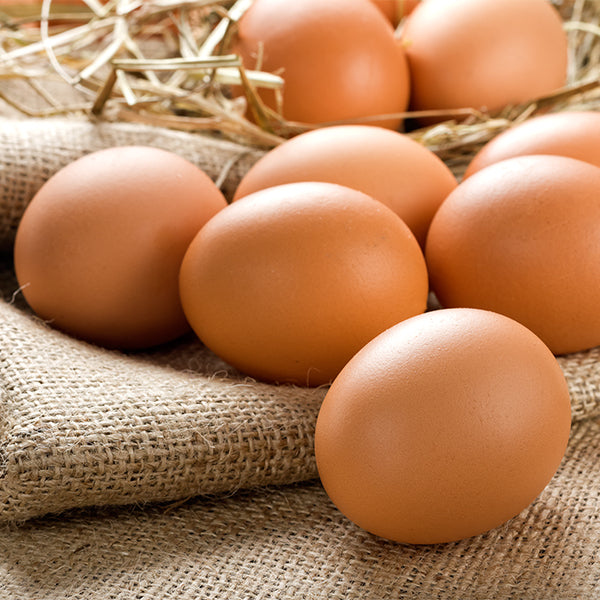Tus objetivos de salud
La mayoría de los alimentos aportan a nuestro organismo nutrientes esenciales. En algunos casos, distintos alimentos aportan nutrientes similares, pero nuestro organismo no puede absorberlos de la misma forma. Algunos nutrientes contribuyen a funciones comunes de nuestro organismo, mientras que otros aportan beneficios únicos. Es un área compleja y aquí simplificamos algunos de los alimentos y sus nutrientes que contribuyen mejor a alcanzar sus objetivos de salud.

Inmunidad
El sistema inmunológico es uno de los sistemas más complejos del cuerpo, formado por una red de células, moléculas, tejidos y órganos que trabajan juntos para proteger el cuerpo.
Hay muchos nutrientes implicados en el funcionamiento normal del sistema inmunológico. Por ejemplo, vitamina a, procedente de productos lácteos, verduras de hojas verde oscuro y frutas y verduras de color naranja, ayuda a los glóbulos blancos a identificar patógenos (bacterias desagradables que causan enfermedades). vitamina c Se encuentra en frutas cítricas, bayas, vegetales verdes y pimientos, ayuda a las células inmunes a atacar patógenos y mantener una piel sana, que actúa como barrera contra la infección. Otros nutrientes importantes para un sistema inmunológico saludable incluyen Vitamina B6 y Vitamina B12, vitamina d, folato, Hierro, Selenio y Zinc. A medida que envejecemos nuestro sistema inmunológico se vuelve menos eficiente, por lo que llevar una dieta variada y nutritiva es aún más importante.
Descubra nuestros Multivitamínico diario vegano.
Energía
El cuerpo necesita energía para crecer, mantenerse caliente y realizar actividad física. La energía proviene de los carbohidratos, grasas y proteínas de los alimentos y bebidas que consumimos.
A mantener un peso saludable , necesita equilibrar la cantidad de energía (o calorías) de su dieta con la cantidad de energía que utiliza mediante la actividad física. La grasa contiene 9 calorías por gramo, que es más del doble de calorías por gramo que las proteínas (que tienen 4 calorías) y los carbohidratos (que tienen 3, 75 calorías). El alcohol también contiene calorías: 7 calorías por gramo, pero se las denomina "calorías vacías" porque no tienen valor nutricional.
el principal fuente de energía para el cuerpo y el cerebro son carbohidratos que se descomponen en glucosa (azúcar) antes de ser absorbidos en la sangre. Los alimentos con carbohidratos ricos en almidón, como el pan, los frijoles, la pasta, las patatas y la avena, proporcionan una liberación lenta y constante de energía (glucosa) a la sangre, así como nutrientes como Vitaminas B que ayudan a liberar energía de los alimentos. Tu cuerpo también puede utilizar Proteína como fuente de energía. pero prefiere no hacerlo porque el proceso de descomponerlo para obtener energía es muy ineficiente. El cuerpo necesita una pequeña cantidad de grasa para obtener ácidos grasos esenciales (Omega-3) y para ayudar al cuerpo a absorber vitaminas liposolubles como vitamina a, vitamina d, vitamina e y vitamina k. Cualquier energía que el cuerpo no utilice se convierte en grasa corporal.
Descubra nuestra alta resistencia Complejo de vitamina B.


Digestión
La digestión implica descomponer los alimentos que ingiere en partes lo suficientemente pequeñas como para que su cuerpo las absorba y las utilice para obtener energía, crecimiento y reparación de células. Tener suficiente fibra en su dieta es importante para una sistema digestivo saludable y prevenir el estreñimiento y síntomas del SII. Para los adultos se recomienda al menos 30 g de fibra al día.
Los alimentos que aportan fibra incluyen cereales integrales, patatas, frijoles y legumbres, verduras, frutas, frutos secos y semillas. Los nervios y las hormonas ayudan a controlar el proceso digestivo, por lo que se requiere una variedad de vitaminas y minerales para que el sistema digestivo funcione. Por ejemplo, el Vitaminas B Ayuda a descomponer los alimentos para que el cuerpo pueda utilizarlos como energía y Calcio es necesario realizar algunas de las enzimas digestivas (que ayudan al proceso digestivo).
Mantenerse activo y bien hidratado puede ayudar al proceso digestivo. También es útil incluir una amplia variedad de alimentos vegetales en su dieta, ya que esto proporcionará una variedad de fibras y nutrientes para alimentar al bacterias beneficiosas en tu intestino.
Descubra nuestros Gut Works pre y probiótico
Cerebro
El cerebro depende de un suministro constante de energía (en forma de glucosa), idealmente de alimentos como cereales integrales, frijoles, nueces, semillas, frutas y verduras que se digieren lentamente para proporcionar un suministro constante de glucosa al cerebro.
Muchos nutrientes son esenciales para el funcionamiento normal del cerebro. Aproximadamente el 60% del cerebro está compuesto de grasa y la mitad de esa grasa está ácidos grasos omega-3, por lo que las fuentes dietéticas de estas grasas beneficiosas, como el pescado azul, son vitales para el cerebro. El Vitaminas B, vitamina c y los minerales: Calcio, Cobre, Magnesio, Yodo, potasio y Zinc todos tienen papeles importantes en la función normal del cerebro y sistema nervioso.
Mantenerse bien hidratado es importante ya que la evidencia muestra que incluso una ligera deshidratación puede afectar su función cerebral y estado de ánimo. Trate de beber de 1, 5 a 2 litros de líquido al día.
Descubrir Combustible cerebral | Para la memoria y el enfoque.


Corazón
Una dieta saludable para el corazón es aquella que tiene un alto contenido de fibra procedente de cereales integrales y frutas y verduras, bajos en sal y bajos en grasas, particularmente grasas saturadas (provenientes de cortes grasos de carne, mantequilla, galletas y bollería). Es útil incluir en la dieta las grasas insaturadas de pescado azul, nueces y semillas, y aceites saludables como el aceite de oliva y el aceite de colza para ayudar a aumentar los niveles de colesterol bueno y ayudar al cuerpo a absorber las vitaminas liposolubles.
El corazón necesita una variedad de minerales y vitaminas para funcionar bien. Por ejemplo, El magnesio es vital para el corazón. latir ya que ayuda al músculo cardíaco a contraerse. El potasio ayuda al cuerpo a mantener una presión arterial normal y La vitamina K es necesaria para la coagulación sanguínea normal..
Descubra nuestros Citrato de magnesio vegano.
Piel,cabello y uñas
La piel es el sistema de órganos más grande del cuerpo. Forma una barrera protectora de nuestro entorno externo y ayuda al cuerpo a mantener la hidratación y regular nuestra temperatura corporal. La capa exterior de células de la piel se renuevan cada 28 a 31 días, por lo que si realiza cambios positivos en su dieta, es posible que no note el beneficio en su piel hasta dentro de unas cuatro semanas. Obtenga más información en nuestro artículo. Los mejores alimentos y vitaminas para una piel radiante.
Varios vitaminas y minerales son importantes en la salud de la piel. vitamina c Tiene un papel importante en la cicatrización de heridas y es necesario para producir colágeno (que proporciona estructura a la piel). Ingesta inadecuada de algunos de los Vitaminas B puede provocar que la piel se enrojezca, se descame o se decolore.Zinc es importante para mantener piel, cabello y uñas saludables con alimentos como carnes, mariscos y frutos secos, siendo fuentes útiles de Zinc. Selenio, que se encuentra en el pescado, la carne y los frutos secos (en particular, las nueces de Brasil) es un potente antioxidante que ayuda a mantener cabello y uñas saludables.
Descubra nuestros Multivitamínico diario vegano.


Huesos
El hueso está formado por una matriz proteica que se fortalece con minerales como Calcio y fósforo. La masa ósea aumenta hasta que llegamos a los 20 años. A partir de los 40 años aproximadamente, la masa ósea disminuye gradualmente.
Hay varios nutrientes que desempeñan un papel en el mantenimiento de huesos sanos, incluidos Proteína, vitamina c, vitamina k,Magnesio, Manganeso y Zinc. De particular importancia es el calcio, que es necesario para ayudar fortalece tus huesos y vitamina d para ayudar al cuerpo a absorber el calcio. La leche y los productos lácteos son las mejores fuentes de calcio. Veganos o personas que excluyen alimentos lácteos, deben tener especial cuidado en que su dieta contenga suficiente calcio, así comovitamina d.
La osteoporosis (adelgazamiento de los huesos debido a la pérdida de calcio) es más común en los adultos mayores. particularmente mujeres después de la menopausia. Fumar y consumir mucho alcohol aumentan la tasa de pérdida ósea y el bajo peso aumenta el riesgo de osteoporosis.
Descubra nuestros Soporte para huesos y músculos.
Musculatura
Los músculos le ayudan a controlar el movimiento, la respiración, los latidos del corazón y la digestión. El ejercicio regular y una dieta saludable son importantes para mantén tus músculos, especialmente a medida que envejeces. La pérdida de masa muscular es un síntoma natural del envejecimiento que comienza a los 30 años. A partir de los 40 años, la masa muscular disminuye aproximadamente un 8% cada década, aumentando hasta un 15% por década a partir de los 70 años.
La proteína es particularmente importante para desarrollar y mantener los músculos.. Espaciar la ingesta de proteínas a lo largo del día ayuda a optimizar el beneficio para la masa muscular. Incluir algunos alimentos proteicos (como carne, pescado, productos de soja, huevos, lácteos o legumbres) en cada comida beneficiará a tus músculos. vitamina d, Calcio, Magnesio y el potasio también son importantes para el funcionamiento normal de los músculos.


Hígado
El hígado participa en alrededor de 500 reacciones diferentes en el cuerpo. Estos incluyen Filtrar y limpiar la sangre., combatiendo infecciones, produciendo bilis que ayuda a digerir las grasas y a eliminar las sustancias de desecho del organismo. Puede disfrutar de nuestro artículo 'Los mejores alimentos para desintoxicar tu hígado' y nuestro Desinflamar y desintoxicar para la digestión y la salud del hígado.
colinaAyuda a mantener la función hepática normal. Las principales fuentes dietéticas de colina son los huevos, la leche, la carne y el pescado. Los veganos deben tener especial cuidado para asegurarse de incluir algunos fuentes vegetales de colina como brócoli y coles de Bruselas, productos de soja y quinua. Obtenga más información en nuestro blog 'Los beneficios de la colina y dónde encontrarla'.
Descubra nuestros Bitartrato de colina vegano y nuestro Desinflamar y desintoxicar | Digestión y salud del hígado.
Ojos
Tus ojos necesitan una variedad de nutrientes para funcionar correctamente. La vitamina A es clave para una buena visión, especialmente con poca luz.
La vitamina A se encuentra en alimentos de origen animal como los huevos y productos lácteos. Sin embargo, el cuerpo puede convertir el betacaroteno que se encuentra en muchas frutas y verduras en vitamina a, por lo que comer zanahorias, albaricoques, calabazas y verduras de hojas verdes puede beneficia tu salud ocular.
El zinc también ayuda con la visión nocturna. y puede ayudar a prevenir la formación de cataratas. Ácidos grasos omega-3 ayudan a formar la estructura de la retina en el ojo. No consumir suficientes ácidos grasos omega-3 puede provocar problemas de visión, y usted podría considerar una Suplemento de omega 3. Los pescados azules, como el salmón, la trucha y la caballa son los mejores. Fuentes dietéticas de los ácidos grasos esenciales omega-3..
También existen fuentes vegetales de omega-3 como las semillas de lino, las semillas de chía, semillas de calabaza y nueces que el cuerpo puede convertir en los beneficiosos omega-3 en beneficio de la salud ocular.
Descubrir Ojos de pantalla | Para la salud de la visión y nuestro Omega 3 vegano.


Dormir
Un patrón de sueño saludable es vital para la salud física y mental. Dormir puede ayudar a reforzar el sistema inmunológico y mejorar nuestro estado de ánimo, concentración y toma de decisiones. Mientras dormimos, nuestros cuerpos participan en numerosas funciones necesarias, desde la autorreparación y restauración hasta la consolidación de la memoria. Dormir mal puede tener graves consecuencias para la salud.
Dormir bien es mucho más que a qué hora te acuestas, lo que comes juega un papel importante en la calidad de tu sueño . Un cambio en los hábitos alimentarios puede alterar tu sueño. Por eso es importante nutrir el cuerpo con una dieta equilibrada rica en nutrientes que favorecen el sueño para disfrutar de un sueño reparador.
Si usted sufre de falta de sueño, no está solo; Nuestra investigación de más de 12.000 mujeres y hombres mostró que el 42% tiene dificultades para dormir o padece insomnio con regularidad . Un sorprendente 73% de las personas tiene problemas para dormir al menos 3 noches a la semana. Descubre nuestra fórmula nootrópica avanzada, Vegan Nights® . El 80% de las personas que lo toman disfrutan de un mejor sueño. Si sientes ansiedad por las noches, te recomendamos nuestro Ashwagandha KSM-66® con Vegan Nights® para dormir mejor .
















